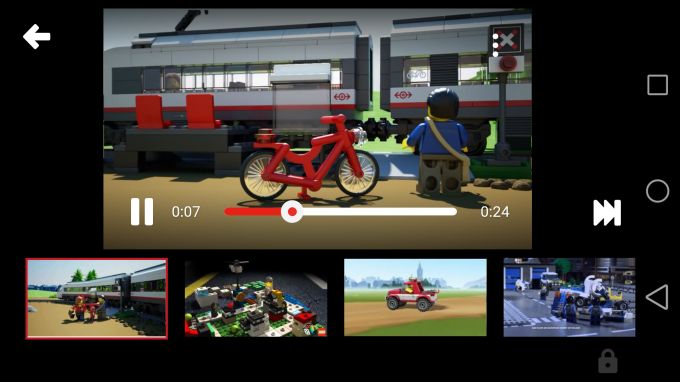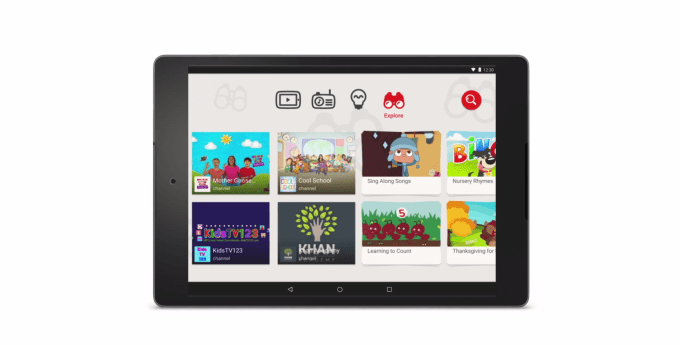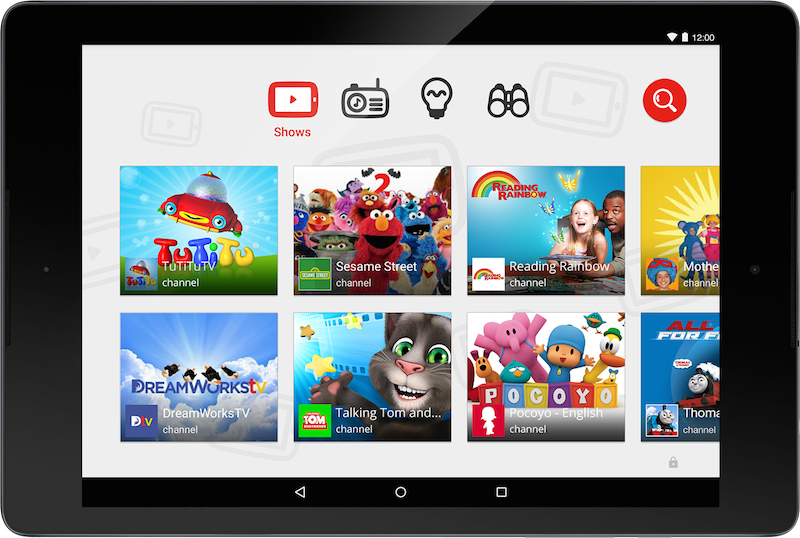YouTube announced changes to its kid-friendly YouTube Kids mobile application this week designed to better educate parents on how the app works and the protections it offers, following a number of complaints, including those to the FTC, from consumer watchdog organizations. But the groups today are saying that YouTube hasn’t gone far enough with the updated YouTube Kids app, calling the changes “superficial.”
Of particular concern, the organizations feel that the advertising that takes place in the app is still “excessive and deceptive” in nature, and doesn’t meet the same guidelines as the advertising permitted on children’s television programs.
The issue the groups raise is one that’s worth discussing, especially as mobile phones and tablet computers become the main screen of choice for today’s children. A mobile technology study this year found that 36 percent of U.S. parents surveyed reported their children had interacted with smartphones or tablets before they turned one year old. Another 36 percent were playing mobile games by age two.
Meanwhile, as is often the case with shifts in consumer adoption of new innovations, laws and regulations are slower to catch up with the reality of how technology is actually being used.
That appears to be the case with something like YouTube Kids, which offers a curated selection of “kid-friendly” videos aimed at the pre-school to elementary school set organized into topical areas like “Shows,” “Music,” “Learning” and “Explore.”

For children, using the app to browse video content is effectively taking the place of watching television. It even offers them “shows” in the form of web series, and other content from well-known kids’ entertainment brands like DreamWorks TV, Jim Henson TV, Mother Goose Club, Talking Tom and Friends, National Geographic Kids, Reading Rainbow, and Thomas the Tank Engine.
However, though YouTube is becoming “new TV” in a number of ways, the Kids app it isn’t required to meet the same regulations that apply to the television industry. And groups like Campaign for a Commercial-Free Childhood (CCFC) and Center for Digital Democracy (CDD) take issue with that.
Explains Angela Campbell, the attorney representing the two groups in their complaint to the FTC, “Google is intentionally allowing advertisers to reach children aged 5 and under using the YouTube Kids app. Advertising to young children, who do not have the cognitive ability to distinguish between programming and advertising, is deceptive and unfair to children,” she tells us.
On children’s programs shown on broadcast television, cable or satellite TV, FCC regulations don’t allow for the same type of advertising that’s permitted today in the YouTube Kids app. For example, host selling is not permitted; program material has to be separated from commercials; plus, there are guidelines that set time limits around how often commercials are shown.

But in YouTube Kids, YouTube Kids’ advertising policies – which prohibit the advertising of food, beverages and other products – now only apply to paid ads sold by Google. These paid ads are the labeled, 30- or 60-second videos that are shown before the child’s selected video.
However, notes Campbell, paid ads make up “only a tiny fraction of the content available on YouTube Kids.”
“This means that the vast majority of the content available on YouTube Kids is not subject to any limits on advertising,” she says. “….And as CCFC and CDD showed in their complaint to the FTC, [YouTube Kids] includes actual television commercials, company-produced promotional videos, and videos with host-selling and paid product placements.”
For example, if a child searches for “cookie” on the app, they may come across a TV commercial from a cookie company on a user’s channel on YouTube Kids. But because the video is on a user’s channel, Google would not consider this video a “paid ad” – so it wouldn’t be subject to YouTube’s Ads policies.
Google, for what it’s worth, discloses this to parents by way of a new disclaimer added to the app store description:
“YouTube Kids contains paid ads in order to offer the app for free. Your child may also see videos with commercial content from YouTube creators that are not Paid Ads. For more information, please check out our Parental Guide.”
(That guide is here.)
In other words, the company is being transparent about its policy to some extent, but it’s saying paid advertising as a necessary evil in order to keep the app free. However, labeled, paid advertisements that are clearly separated from the shows and other video content aimed at kids can keep the app free. So the disclaimer is a bit disingenuous as it doesn’t reference how the creators’ own ads or paid endorsements are involved.

For the watchdog groups, their end goal is to force kids’ video app makers, like Google, to follow the same guidelines that apply in the television industry.
This is not only because the apps themselves are becoming a real alternative to television programing as more kids adopt mobile technology, and more households cut the cord with pay TV providers, but also because app content can also be mirrored on the big screen – effectively becoming “TV.”
In fact, the updated version of the YouTube Kids app now allows users to stream content to Chromecast, Apple TV, game consoles and smart TVs, says Google.
“The point is that, were YouTube Kids a broadcast, cable or satellite provider, the failure to separate commercial content from programming would be a clear violation of FCC rules,” Josh Golin, the Executive Director at CCFC, points out. “We believe it is ludicrous that Google shouldn’t have to play by the rules just because YouTube Kids is an app. The fact that YouTube Kids now is designed to be shown over television sets just drives this point home even further,” he says.
As for the FTC complaint, the investigation is still underway and no timetable to a ruling has yet been offered.
Update, 10/2/15, 2:25 PM ET: This article was updated to clarify the app store description references paid, not unlabeled, ads.































Comment